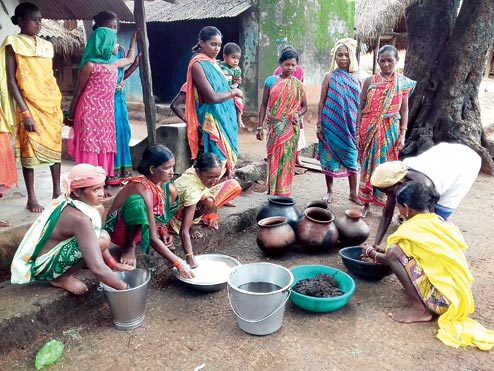
Koraput: Tribal farmers of the district are reaping the benefits of organic farming at a time when the use of expensive fertilisers and pesticides have become rampant to ensure greater agricultural productivity and pest-free output.
"We never use fertilisers and pesticides available in the market as it is costly and we can't afford it. Hence, we are using organic manure prepared at home that is a perfect substitute for both," said Hari Miniaka of Koijhankar village in the district's Lakshmipur block.
In this tribal-dominated village, most families subsist on organic farming. The yield is good, the costs low, the danger from harmful chemicals minimal and the profits, healthy.
According to Hari, the procedure is very simple and one has to spend around Rs 30 to produce this natural fertiliser for one acre of cultivable land.
Explaining the process to prepare natural fertiliser, he said one kilogram of cow dung, one litre of cow urine, 100 gram of molasses, 100 gram of besan, one kilogram of soil collected from anthill and one litre of water are kept in an earthen pot for seven days. Leaves of at least five different varieties are put inside the pot.
"After seven days, colour of the water turns green and one glass of water is diluted with 20 litres of normal water. Once sprinkled in the paddy field, it works wonders, increasing fertility of the land apart from preventing pest onslaught on crops," said Dasri Miniaka, another villager.
Nestled amidst hills and forest, almost all households of Koijhankar uses this organic manure. The lush green fields surrounding the tiny village reflect the success stories of tribal farmers.
Like the residents of Koijhankar, the success of the technique has made it a craze among the tribals of nearly 100 villages of the district's Laxmipur, Boipariguda, Koraput and Semiliguda blocks.
"We never use inorganic pesticides and fertilisers in our field. Also, there is high demand for organic farming vegetables in urban areas," said Dauna Talia, a tribal farmer of Mundaguda village under Boipariguda block.
Experts say organic farming makes agriculture-based livelihood sustainable and reduces the costs of cultivation. It also increases the net income of small and marginal farmers.
"While organic farming reduces the cost of production, it is also good for environment as carbon emission is high when fertilisers and pesticides are used. Moreover, life of soil increases and nutrient content of crops remains intact," said Ramesh Chandra Swain.
Swain is an organic farming expert who works with a voluntary organisation. He has been promoting organic farming in the region.










